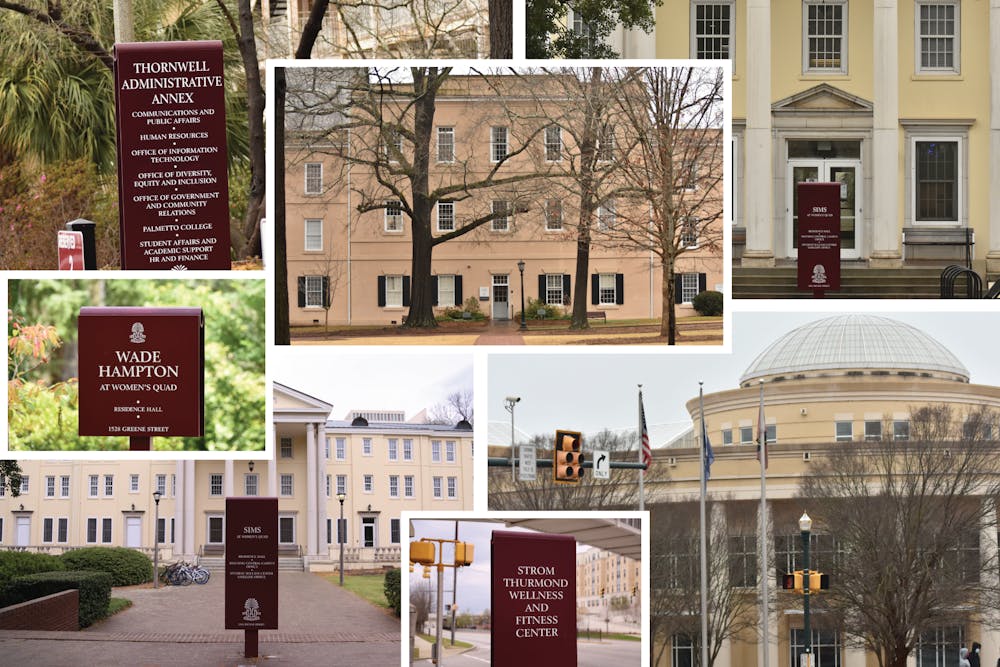The Commission on University History released its final report in July, which gave recommendations for renaming buildings to interim university President Harris Pastides.
USC's board of trustees will not hear the recommendations, according to an email Pastides sent to the USC community. Pastides said South Carolina law does not allow a university to change building names.
The buildings, which were named after problematic figures in South Carolina’s history, include the Strom Thurmond Wellness and Fitness Center, Thomas Cooper Library and Sims Residential Hall, among others.
The South Carolina Heritage Act, the law Pastides referred to, requires a two-third vote in the state legislature to remove or amend any historic monument or public space named after a historic person.
Caley Bright, president of the NAACP chapter at USC, said she felt disappointed with the email.
"I know that a lot of other students have been working on this issue since their freshman year, and they've just graduated. So it's like a lot of the work we did just went down the drain," said Bright, a second-year criminology and criminal justice student.
Joseph Boyd, the president of the National Panhellenic Council, said he felt "disappointed, not surprised," with the shutdown of name changes and wanted to see attention focused on state legislators rather than the university.
"It doesn't matter what we say to the university at this point, but like, as long as legislators are going to continue to block our efforts then we're not going to get the results that we like," Boyd, a fourth-year dance education student, said.
Before the final report was released, Pastides announced in an email the creation of an Implementation Group to help execute the report's recommendations.
Some recommendations included issuing a booklet during orientation. This included a "brief, inclusive, and illustrated history" of USC, virtual and walking tours for different areas of USC history and a graduation requirement to take a class focused on diversity and inclusion, among others.
Commission research assistant Melissa DeVelvis performed research for the Commission on University History. This research included four main points, according to its website.
One point includes making a website about the university's history by pulling information from USC publications, local news and more. The commission also compiled a list of notable people in South Carolina and Columbia history and put them into groups such as LGBTQIA+ history, civil rights history and more.
The Names on the Landscape subcommittee chose some names to write brief biographies about and to recommend those names for renaming purposes. DeVelvis then compiled reports on 13 names recommended by the Names on the Landscape committee for review. These reports outlined the people's lives, connection to USC and when and why the buildings were named after them.
According to the report, there are 76 buildings named after people on USC's campus. In total, there are 27 different recommendations to educate people on these buildings under the Joint Recommendations by University History and Communications and Education Subcommittees section of the report.
The ability of the university to create change isn't in question, but whether the university can handle the issue of building names in a way that will satisfy students, Boyd said.

"Right now, it's just up for people in power to make the right decision and to use their power in a way that honors the students," Boyd said.
President of the College Democrats at USC Emma Schwertfuehrer called the move to dismiss the name-changing recommendations "super weak" and wanted to see USC work with legislators to deal with laws that prohibit name changes of buildings, she said.
"I think that a lot of the faculty and people involved in the creating of the commission, the work that the commission did, have real intentions to properly present the history of the university and not glorify the parts that shouldn't be celebrated," Schwertfuehrer, a second-year vocal performance student, said. "But I feel like it all becomes empty when they don't try at all to rename the buildings."

